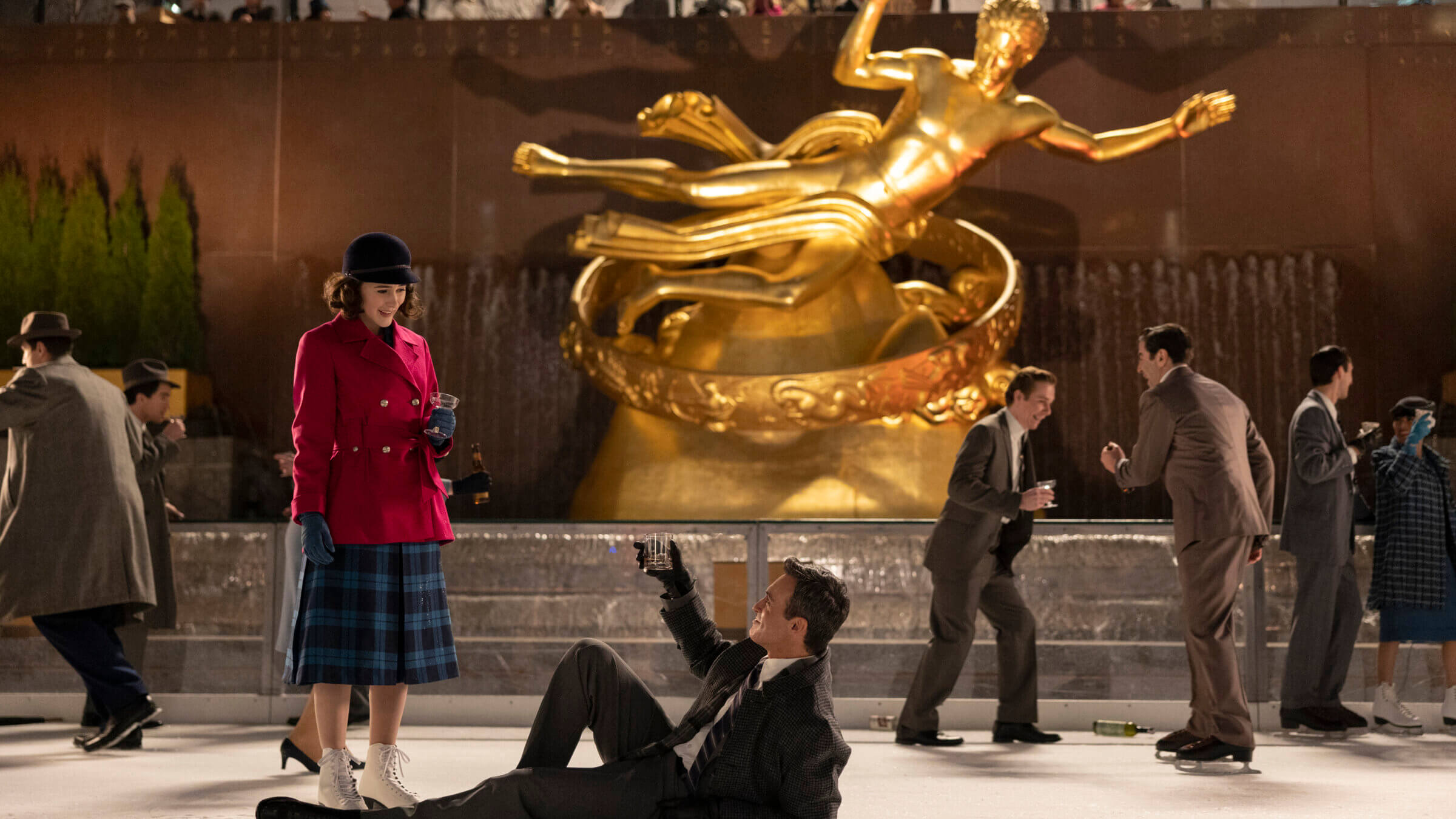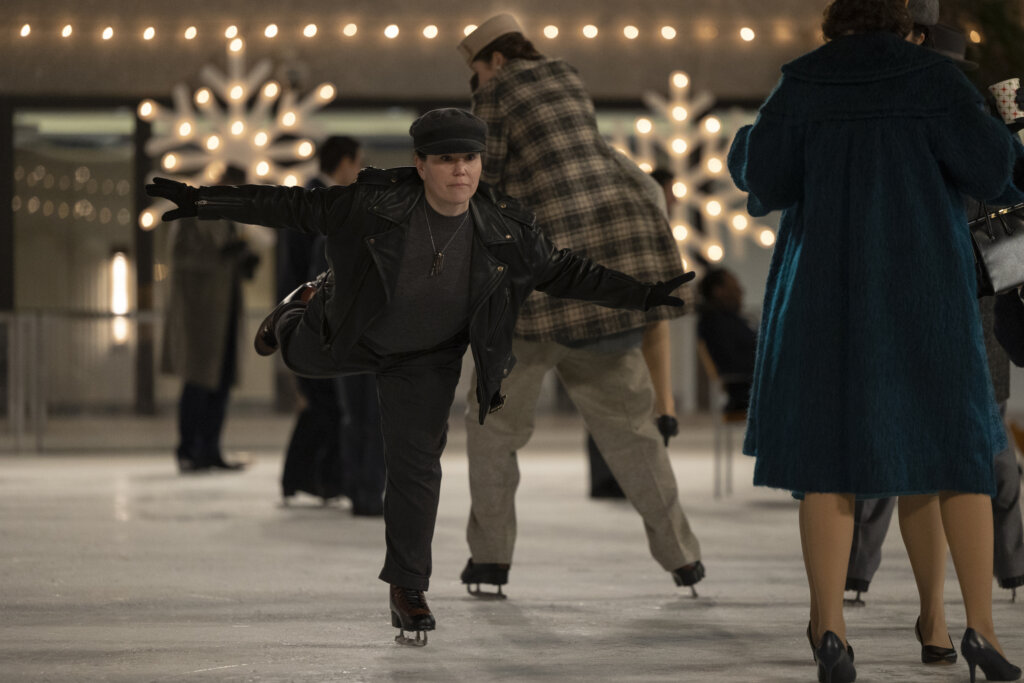The final season of ‘Mrs. Maisel’ undermines TV norms. It saves the show
In its final season, Amazon’s hit lets its characters have more fun — and, in doing so, find unexpected depth

As always, the show is full of great New York City scenery, like Midge skating at Rockefeller Center. Courtesy of Amazon Studios
Midge Maisel has always struggled with her identity. She’s a dutiful-ish mother and talented homemaker, but also a standup comic who roasts her family each night. She’s charming, lovable, peppy and independent, but also pushy and prone to tantrums and mean jabs. She loved being married, but also felt trapped by being a wife.
Just like its heroine, The Marvelous Mrs. Maisel has struggled with its identity as a show. At first, it was a somewhat overwritten but ultimately charming romp through New York Jewish history — Lenny Bruce, the Catskills, Zabar’s and the Upper West Side. But in later seasons, the show got grittier; Midge got less likable and the show took on big issues like racism, homophobia and the sexism Midge faced trying to make it in show business in the mid-20th century. It didn’t always quite stick the landing.
The writers seem to have learned their lesson. In its fifth and final season, Mrs. Maisel is returning to its roots: kitsch, costumes and witty standup monologues. The result? The show’s best season in years.
Many episodes feel like drawn-out excuses for the writers to stretch their show-biz muscles — which I loved, although your mileage may vary. In one, Midge is hawking waste disposal services at an industrial expo dominated by a lengthy song-and-dance number about trash, complete with a singing trash heap and tap-dancing garbage men with garbage can lids as shoes. And there’s another, separate musical number in the same episode — this one selling kitchen appliances — meaning about half of the episode’s runtime is in song. (I have no idea if expos in the 1960s actually involved theatrical performances, but I hope they did; I found the whole thing quite delightful.)

Of course, it’s all a little goofy, but it’s hard to mind too much. After all, the show has never excelled at realism. Mrs. Maisel has always been best as a heavily stylized piece of nostalgia, and the final season really leans in. Bouncing between the 1960s, where the show left off last season, and visions of the future, we’re treated to all eras of costumes and references — and even some pretty funny photoshop, leveraged to write Midge into various historical events.
We see Ethan and Esther, Midge’s kids, all grown up; Ethan has moved to a kibbutz in Israel, and Esther is a scientist. (Both, of course, struggle with their relationship with their larger-than-life mother; a scene of an adult Esther on her therapist’s couch opens the season.) Midge’s ex-husband Joel and manager Susie get lengthy episodes that flip-flop between their past and future selves.
The storylines can get a little confusing — some are presented entirely out of order, while other arcs arise and are resolved so fast you almost miss them — but by the end of the season, you know where everyone stands.
Most shows today, in our era of prestige TV, end on an open note, leaving viewers with something to chew on. The Marvelous Mrs. Maisel does not do that; by the second episode, you know the answer to the show’s long-dangled question of whether or not Midge is ever going to really make it. And the rest of the season is devoted to wrapping up every storyline in a perfect little bow.
(The first two episodes also efficiently dispatch several characters from previous seasons that the writers have apparently decided are not worth keeping around.)
It’s a surprising choice, perhaps, to resolve the series’ main source of narrative suspense so early in the season. And the neatness of the endings might feel a little too pat. But it’s a choice that frees the show to move away from the overly serious topics that created stumbling blocks in the past several seasons. The show’s clumsy handling of race regarding Black crooner Shy Baldwin, for example, and Midge’s sneering at other women in her pursuit of feminism, were all painful to watch.
And when the show leans into its heavily stylized nature, it also manages to sidestep its worst faults. Its Jewishness has always lacked depth and leaned on stereotypes played for laughs. But in a show where realism isn’t the point and everything is kitsch, that doesn’t seem so problematic. The same goes for its discussions of feminism and homophobia. The presentation of women’s struggle for equity, in particular, gains an unexpected nuance and realism in the final season.
But that’s not the point; the show is about fun: lovable characters, great costumes and fast patter in every scene. And if some social commentary slips in on the side? All the better.
A message from our Publisher & CEO Rachel Fishman Feddersen

I hope you appreciated this article. Before you go, I’d like to ask you to please support the Forward’s award-winning, nonprofit journalism so that we can be prepared for whatever news 2025 brings.
At a time when other newsrooms are closing or cutting back, the Forward has removed its paywall and invested additional resources to report on the ground from Israel and around the U.S. on the impact of the war, rising antisemitism and polarized discourse.
Readers like you make it all possible. Support our work by becoming a Forward Member and connect with our journalism and your community.
— Rachel Fishman Feddersen, Publisher and CEO






























